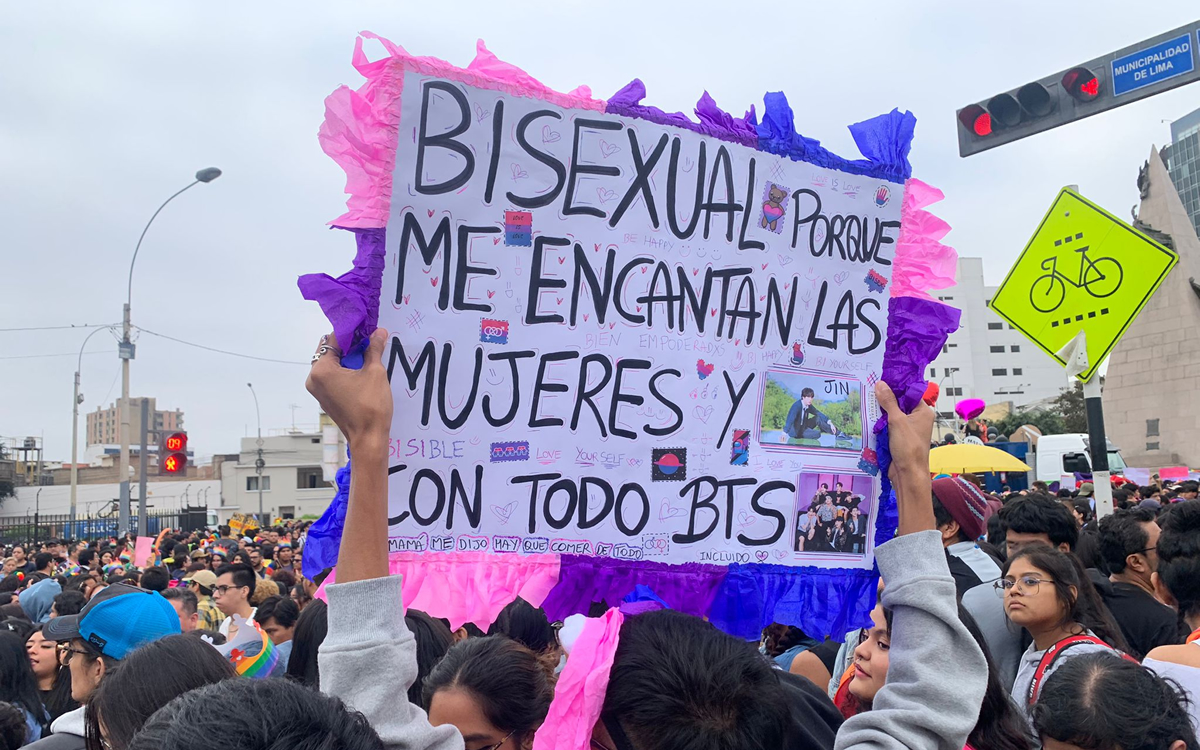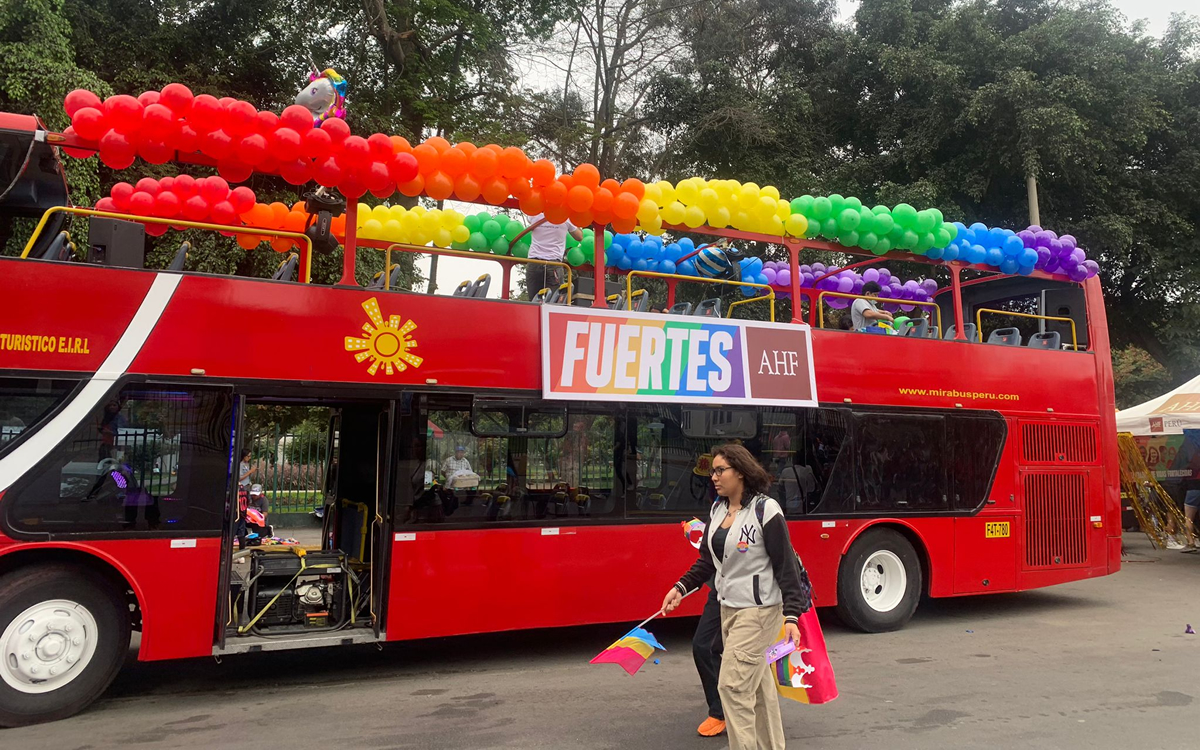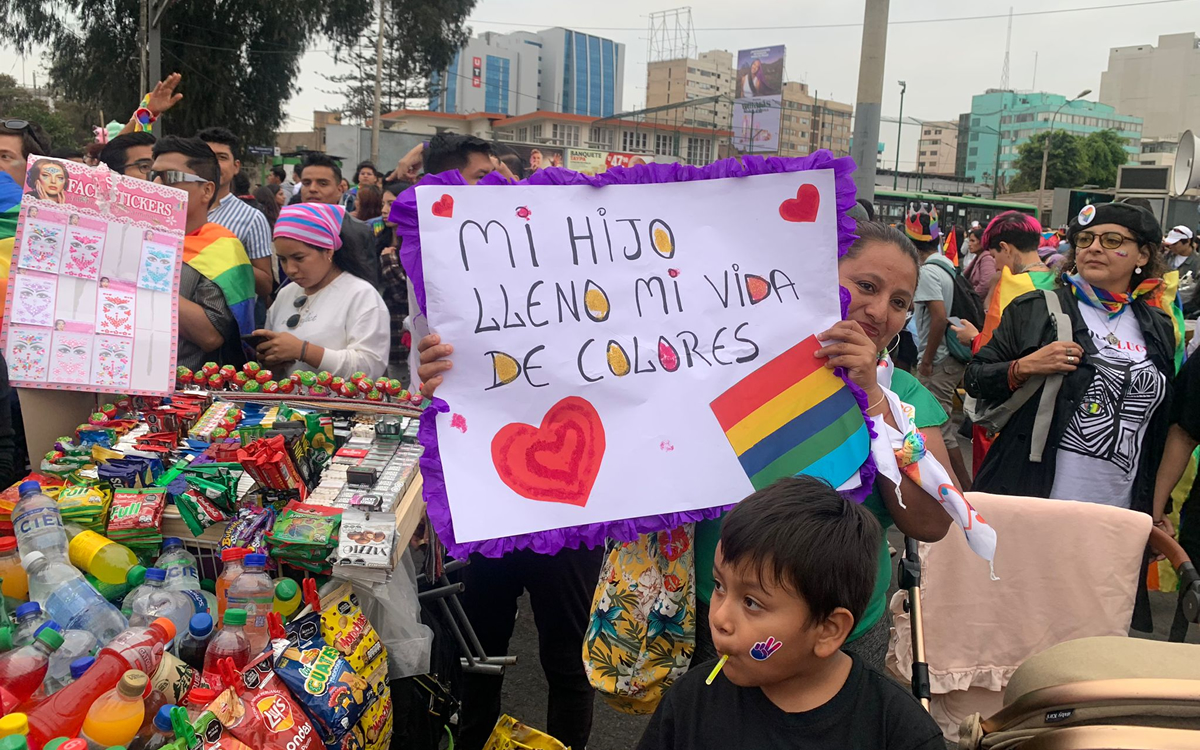South America
Lima Pride march participants send message to Peruvians
More than 50,000 marchers demanded equal rights

LIMA, Peru — Not even the gray skies of Lima could dim the vibrant festivities of the Pride march in Peru’s capital on July 1.
This year marked Lima’s 21st annual Pride parade and organizers told the Washington Blade it was the biggest yet. More than 50,000 Peruvians marched through the historic streets of the city center dancing with drums, flags and posters. But for some at the march, Pride this year took on a different tone.
The theme of this year’s march was “Pride is Democracy.” A huge screen on the stage at the center of the Pride festivities had a message which said: “Pride is democracy: For a true democracy with social justice and representation.”
With this theme in mind, most of the people who spoke to the Blade talked about the state of LGBTQ and intersex rights in Peru and their fight to maintain and improve Peru’s democracy.
“This year, more than eight trans women have been murdered in a truly ruthless way,” said Leila Heurta, the director and founder of Feminas Peru, an NGO dedicated to the empowerment of transgender women. “And that is why we can’t forget the political side of the march. That’s why the motto of this year’s march is: without pride, there is no democracy.”
While Peru is a democracy, it is one of the few countries on the continent that offers zero legal recognition for same-sex couples. Further, as many of the marchers pointed out, police often fail to investigate the deaths of murdered trans women or arrest the culprits.
Jorge Apolaya, one of the organizers of this year’s march, told the Blade he believes Peru’s democracy is backsliding.
“[This year’s march] takes place in a year in which we feel that there are more and more setbacks regarding the political situation of the country,” said Apolaya. “Our democracy is getting weaker and weaker. It is very important for us that we can live in a democracy, because only in a democracy can we demand respect for the human rights of LGBT people.”
Despite the lack of rights and legal protections for LGBTQ and intersex people in Peru, many marchers seemed optimistic about their future.
Steve Arnao, a 36-year-old doctor, attended the march with his boyfriend.
“I see a change that is slowly taking place in Peru,” he told the Blade. “But it is important that each year, we join the march and continue fighting for our rights.”

The battle for LGBTQ and intersex rights in Peru is steep.
According to a 2020 Ipsos survey, only 38 percent of Peruvians were in support of civil unions for same-sex couples — seven percentage points higher than a similar survey in 2014, but still nowhere close to a majority of the country.
A 2023 survey from Ipsos revealed that 98 percent of LGBTQ and intersex people surveyed were either “extremely” or “very” dissatisfied with “the role of the State in guaranteeing rights of diverse families/LGBTIQA+ people.” Fifty-six percent of respondents reported having experienced discrimination.
“We will never lose hope,” says Apolaya. “Even with this Congress, as part of civil society and as part of the social fabric of this country, we will continue demanding that the minimum of democracy that we have persists and that we do not lose it.”
Another prominent group of attendees at the march is one that has been steadily increasing in Peru over the last few years: Venezuelan immigrants. According to the U.S. Agency for International Development, Peru is the second-largest recipient of Venezuelans and the largest host country of Venezuelan asylum seekers worldwide. Peru hosts more than one million Venezuelans, with most of them living in the capital.
Therefore, many LGBTQ and intersex Venezuelans joined Lima’s Pride parade. One of those Venezuelans was Mariangel Rodriguez. Despite living in Lima for nine years, Rodriguez hasn’t always felt comfortable in LGBTQ and intersex spaces in Peru.
“I think part of my concern about not participating in the previous marches was related to the fact that I’m a minority within a minority,” said Rodriguez. “Being a woman, a migrant who comes from a very hard socio-political context … this has transformed the course of my life.”
Rodriguez went on to describe her experiences with discrimination in Peru.
“In many parts of Peru, it is widespread to see migrants as something negative,” said Rodriguez. “And well, in the past, being a Venezuelan person, obviously I have felt the need to protect and take care of myself by avoiding the marches. But generally, this march has meant something very important to me, not only because it was the first time I went, but also because I saw how many things have evolved in such a short time.”
Despite homophobia and transphobia coming from both the left and right in Peru, many activists have noticed a change in attitudes toward LGBTQ and intersex people, especially among the younger generation.
On the sidelines of the march, one mother held a sign which read: “My son has filled my life with colors.” She told the Blade that her only wish for her 18-year-old child is for him to live his life in the way he wants and for him to be happy.

Chile
Transgender woman sues Chilean national police
Isabella Panes alleges she suffered harassment, exclusion after becoming ‘carabinera’

Isabella Panes in 2022 was celebrated as a symbol of inclusion.
Wearing an olive green uniform and a shy smile, she appeared in the media and on social media as Chile’s first trans female “carabinera” or national police officer. The Carabineros promoted Panes as a sign of openness, but that story has become a dramatic case of institutional discrimination.
Panes today faces the Carabineros in court.
She has denounced a series of systematic acts of exclusion, harassment at work, and violation of fundamental rights that she and her defense team maintains pushed her into a mental health crisis that almost cost her her life.
“My hope is that tomorrow we will be able to live in a world of equality for all. Just that we understand that we are human beings and we have to make life a lot easier for each other,” Panes told the Washington Blade during an exclusive interview.
Panes, 29, grew up in Laja in the Biobío region.
She dreamed of becoming a “carabinera” since she was a child, despite the fact that she faced discrimination because of her gender identity. After years of effort, surgeries and a difficult transition, Panes enrolled in the Carabineros Academy in 2021.
Panes faced the challenge of making her medical processes compatible with the physical demands of training. Even so, she graduated with good marks, and was recognized as part of the new institutional image the Carabineros wanted to project after the 2021 social unrest tarnished their image.
This institutional support disappeared after the media campaign.
Panes alleges she was marginalized from operational duties and relegated to administrative tasks, despite her interest in and training to patrol the streets like any other officers.
“I joined the Carabineros to serve, not to be a marketing decoration,” she said. “I was offered to be part of the change, but only if I kept quiet and accepted the mistreatment.”
The accusations against the Carabineros are serious: Constant mockery by colleagues, dissemination of private information about her personal life, invasive questions about her body and sexual orientation. Panes’s legal representatives said this abuse took place within a context where the institution did not take effective measures to protect their client.
The Carabineros Social Security Administration, known by the Spanish acronym Dipreca, also refused to cover her transition-related medical procedures, arguing they were “aesthetic,” despite medical reports that indicated their importance for Panes’s mental health and well-being.
Panes in January attempted to kill herself by suicide. She managed to survive after calling Chile’s 4141 mental health care number for help.
“They were killing me slowly, from the inside,” said Panes.
Panes has brought her case to the Supreme Court after a lower court ruled in favor of Dipreca’s decision to not cover her medical treatments.
Her legal team in a lawsuit has also accused the Carabineros of employment and systematic discrimination. Panes is seeking damages and institutional reforms.
“The Carabineros used Isabella to clean up its public image, but when it came to guaranteeing real rights, they abandoned her,” said Javiera Zúñiga, spokesperson for the Movement for Homosexual Integration and Liberation, a Chilean advocacy group.
“It is not enough to show up at the Pride march,” she added. “True inclusion is demonstrated in deeds, in daily dealings, in respect for the dignity of all people.”
Panes’s case starkly exposes the limits of diversity policies when there is no deep institutional commitment to implement them.
“I am no longer afraid,” said Panes, ”What happened to me cannot happen again. Not for me, but for all those who come after me.”
Brazil
US lists transgender Brazilian congresswoman’s gender as ‘male’ on visa
Erika Hilton has represented São Paulo since 2022

A transgender Brazilian congresswoman says the U.S. issued her a visa that listed her gender as “male.”
Erika Hilton on Wednesday wrote on her Instagram page that she requested a visa that would have allowed her to travel to the U.S. in order to participate in the Brazil Conference at Harvard University and the Massachusetts Institute of Technology.
The conference took place earlier this month.
“I was classified as ‘male’ by the U.S. government when I went to get my visa,” wrote Hilton, who added a visa she received from the U.S. in 2023 listed her gender as “female.”
Hilton is a Black travesti and former sex worker from São Paulo who won a seat in the Brazilian Congress in 2022. The Washington Blade spoke with Hilton shortly after her election.
“It is a big responsibility … but I feel very honored,” said Hilton. “I very much like to be able to be a representative for my people, and the more than 250,000 people who voted for me have confidence in me,” she said after she spoke at a rally in support of now Brazilian President Luiz Inácio Lula da Silva in a São Paulo square. “This demonstrates that our work has the potential to have a gigantic reach; where we can advance efforts to end death, poverty, misery, genocide that we have.”
President Donald Trump in his inaugural speech announced the federal government’s “official policy” is “there are only two genders, male and female.” The Trump-Vance administration has also banned the State Department from issuing passports with “X” gender markers.
Germany and Denmark are among the countries that have issued travel advisories for trans and nonbinary people who plan to visit the U.S. These warnings come ahead of WorldPride, which is scheduled to take place in D.C. from May 17-June 8.
Hilton said she is “not surprised” the U.S. issued her a visa with a male gender marker.
“I’m also not surprised by the level of hatred and fixation these people have with trans people,” she said. “After all, the documents I presented are rectified, and I’m registered as a woman, even on my birth certificate.”
Hilton further accused the U.S. of “ignoring official documents from other sovereign nations, even from a diplomatic representative.”
“At the end of the day, I’m a Brazilian citizen, and my rights are guaranteed and my existence is respected by our own constitution, legislation, and jurisprudence,” she said.
Editor’s note: Duda Salabert, another transgender Brazilian congresswoman, also said the U.S. listed her gender as “male” on her American visa.
Argentina
Gay, nonbinary parent fights for family in Argentina’s courts
Leonardo Hatanaka alleges they were fired after requesting paternity leave

An unprecedented case could set an important legal precedent for the rights of labor rights for LGBTQ families in Latin America.
Leonardo Hatanaka, a Brazilian pharmaceutical professional, expects an imminent ruling from the Superior Court of Justice in the Autonomous City of Buenos Aires in a case that alleges discriminatory dismissal based on sexual orientation, gender identity, and xenophobia after their son Matteo’s birth in Argentina via “solidarity gestation.” Human rights organizations and international agencies have followed the case closely.
Genzyme de Argentina S.A. and Sanofi in 2023 fired Hatanaka weeks after they notified them of their son’s paternity and requested 180-day parental leave.
“Matteo’s birth was the realization of a dream and the right to form a family with love, dignity and equality, even if that means having to fight every day for our family to be recognized as such,” Hatanaka told the Washington Blade in an exclusive interview.
The National Institute Against Discrimination, Xenophobia and Racism, a government agency known by the acronym INADI that President Javier Milei’s administration has shut down, in November 2023 said Hatanka’s termination was motivated by discrimination based on sexual orientation and gender identity.
(Milei took office in December 2023.)
The General Directorate of Coexistence in Diversity in Buenos Aires’s government in 2024 said institutional xenophobia motivated the firing.
“I am a gay man, foreign, nonbinary, and I had requested to exercise my right to parental leave,” Hatanaka explained. “The company denied access to a basic right to care, which it does provide in other countries, and did not provide any medical coverage for our son, despite his legal registration with both parents’ names.”
Sanofi did not acknowledge responsibility, offer apologies or any kind of reparations, despite the two rulings.
“It was devastating. I was caring for a newborn, at a moment of enormous vulnerability, and the company chose just that moment to abandon us,” said Hatanaka.
The National Labor Court overturned an initial injunction that ordered Hatanaka’s reinstatement. Hatanaka appealed the decision to the Superior Court of Justice in the Autonomous City of Buenos Aires.
“I hope for justice; that the discrimination suffered is recognized, and that this ruling serves as a precedent for all diverse families and LGBTQ+ people who are seeing their rights violated,” said Hatanaka.
The Argentine LGBT Federation, SOS Homophobie in France, and Mothers of Resistance in Brazil are among the organizations that have expressed their support. The latest U.N. report on anti-LGBTQ discrimination also notes the case.
“Companies must go beyond marketing,” Hatanaka emphasized. “Real inclusion requires concrete actions, consistency, and respect for their own policies.”
Hatanaka stressed that “there are instruments such as the UN Guiding Principles on Business and Human Rights. It is time for them to comply with them.” The lawsuit has also become a symbol of the struggle for equality and protection of families with parents who are the same sex.
“I feel I represent many LGBTQ+ families who live in fear of losing everything by exercising their rights,” said Hatanaka. “LGBTQ+ parenting is legitimate, real and deserves protection. No family should be punished for existing.”
-

 El Salvador4 days ago
El Salvador4 days agoGay Venezuelan makeup artist remains in El Salvador mega prison
-

 State Department3 days ago
State Department3 days agoHIV/AIDS activists protest at State Department, demand full PEPFAR funding restoration
-

 Brazil3 days ago
Brazil3 days agoUS lists transgender Brazilian congresswoman’s gender as ‘male’ on visa
-

 District of Columbia4 days ago
District of Columbia4 days agoTwo charged with assaulting, robbing gay man at D.C. CVS store








